Already a member? Click here to login.

Australian Diabetes Educators Association
Already a member? Click here to login.

Already a member? Click here to login.
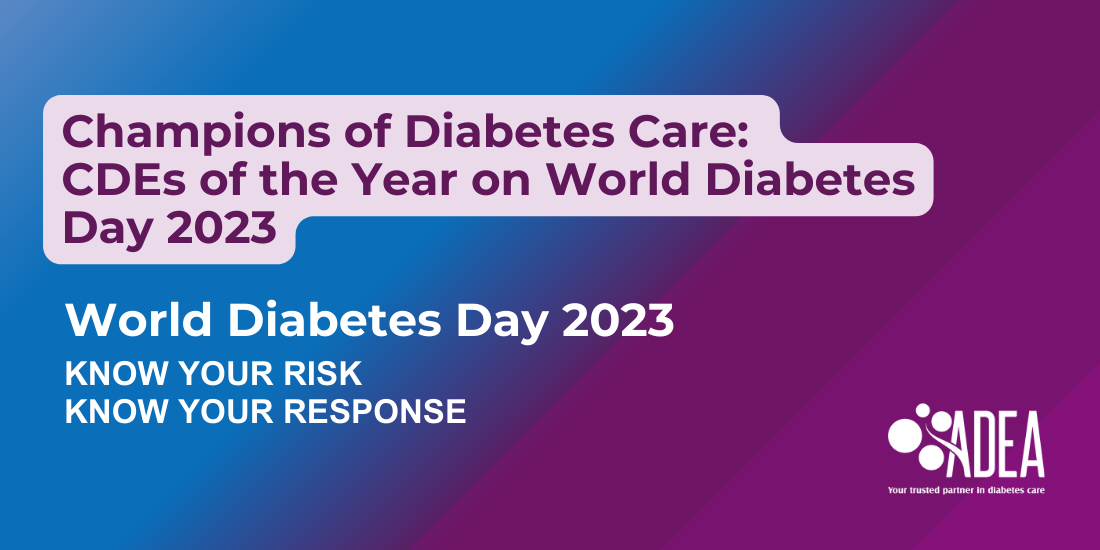
On World Diabetes Day 2023, let’s come together to honour the inspiring work of our members who are transforming the lives of people living with diabetes. Through their dedication and expertise, CDEs are making a significant impact in improving diabetes education and care.
Join us as we celebrate their achievements and reaffirm our commitment to creating a future where diabetes prevention, management, and support are available to all.
| Q&A with NT CDE of the Year 2023, Helen Lamech
Q&A with ACT CDE of the Year 2023, Kristin Turner |
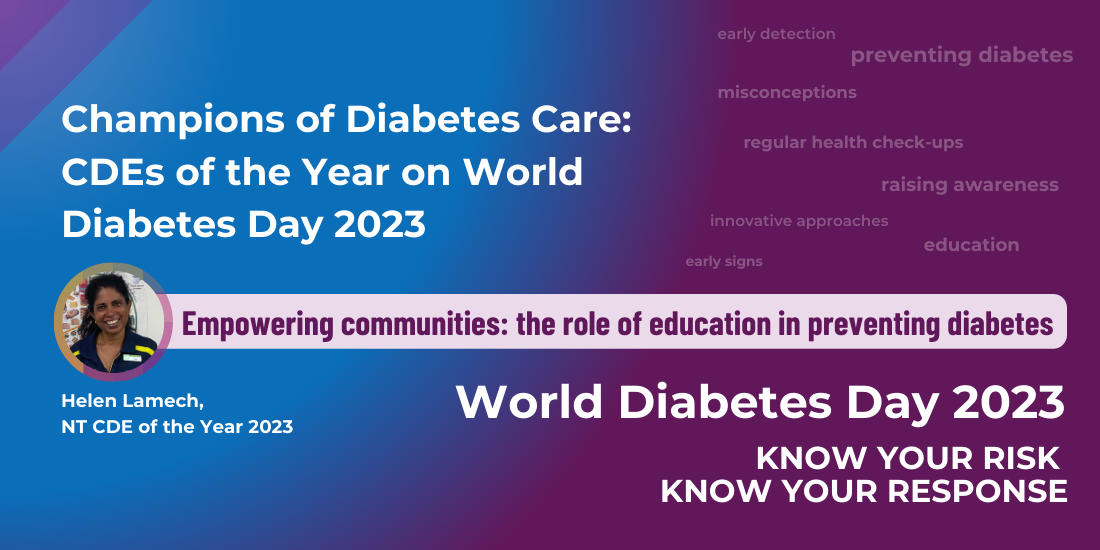
World Diabetes Day often emphasises the importance of prevention and early detection. What role does education play in preventing diabetes and identifying individuals at risk and how can this education be improved?
Education plays a crucial role in preventing diabetes by raising awareness about the symptoms and identifying individuals at risk.
Recognising early signs, such as persistent fatigue, frequent urination, and constant hunger, is vital.
These symptoms, often overlooked as common issues, may indicate underlying diabetes.
Improving education involves fostering a deeper understanding of these signs, dispelling misconceptions, and promoting regular health check-ups.
By enhancing awareness and knowledge, we empower individuals to take proactive steps toward early detection and effective diabetes management.
How important is it for more of the public to be aware of your role to ensure that they seek your expertise and knowledge?
I believe the crucial role of diabetes educators is paramount for the public.
My role as a CDE in Alice Springs brings invaluable knowledge and expertise to the table, ensuring individuals receive the guidance they need to navigate the complexities of diabetes.
By understanding the risk factors, appropriate responses, and necessary care, the public can make informed decisions about their health.
By making them feel safe and supported, they don’t need to go on this journey alone.
Since becoming a CDE, how have you seen the profession change within a diabetes care team/allied health to help ensure people living with diabetes obtain the best access to the care and management?
Since becoming a CDE, I’ve witnessed a significant evolution in the profession.
It’s heartening to observe the inclusion of various health disciplines beyond nursing.
Now, dietitians, pharmacists, podiatrists, and exercise physiologists actively contribute their expertise to enhance health outcomes and broaden access to comprehensive care.
This collaborative approach reflects a positive shift, reinforcing the idea that a multidisciplinary team can better address the diverse needs of individuals living with diabetes, fostering a more holistic and inclusive healthcare landscape.
Also, the integration of technology, particularly close glucose monitoring and insulin pumps.
These advancements serve as a game changer for people living with type 1 diabetes.
What are some of the challenges that people living with diabetes face in accessing diabetes care, and how does your work address these challenges?
As a diabetes and nurse educator based in Alice Springs, I’ve recognised the challenges associated with distance and the high cost of living in this region.
Professionals often hesitate to choose this option, leading to a turnover that impedes the establishment of enduring relationships and trust within the community.
In my role, Healthy Living has strategically employed me to work independently in Alice Springs, addressing this challenge directly.
By being a consistent presence in the community, I aim to build lasting connections, foster trust, and ensure that individuals no longer have to endure the inconvenience of travelling for their diabetes care.
What have been some of the innovative approaches or strategies you have used to enhance diabetes education and care for your clients and/or to help improve diabetes care and education generally?
In Alice Springs, my approach to providing diabetes education involves harnessing the power of a team-based strategy, peer support, and mentorship.
By implementing a mentoring system, individuals navigating their diabetes journey can connect with experienced leaders/members within the community, fostering a supportive environment.
Additionally, I’ve organised social functions such as type 1 retreats and regular catchups for drinks every six weeks.
These gatherings serve as valuable platforms for sharing personal diabetes experiences, allowing community members to find common ground, exchange insights, and provide mutual support.
Through this multifaceted approach, I aim to create a robust and inclusive diabetes education network in Alice Springs.
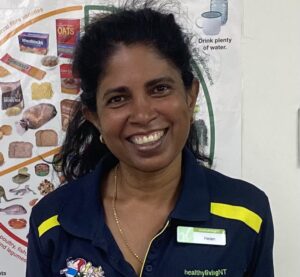
“The demand for diabetes care is growing exponentially, and it highlights the critical need to train more professionals, including community members and Indigenous health workers, to effectively address this surge.”
Helen Lamech, NT CDE of the Year 2023
What do you believe are the most pressing issues or developments in diabetes care and education, and how do you see your role evolving to address these challenges in the future?
In my perspective, one of the most urgent issues in diabetes care and education is the escalating number of individuals being diagnosed with diabetes surpassing the available resources and educators.
“The demand for diabetes care is growing exponentially, and it highlights the critical need to train more professionals, including community members and Indigenous health workers, to effectively address this surge.“
By expanding the pool of well-trained individuals within the community, we can better meet the increasing demand for diabetes education and care, ensuring that individuals receive the support they need to manage their condition successfully.
What are some of the key messages or takeaways you would like people to remember on World Diabetes Day?
On World Diabetes Day, I’d like people to remember the following.
By embracing these messages, we can work towards a world where diabetes is better understood, managed, and, ultimately, prevented.
How can individuals and communities support the goals of World Diabetes Day and promote better access to diabetes care?
Individuals and communities can support the goals of World Diabetes Day by doing the following:
By actively engaging in these actions, individuals and communities can play vital roles in creating a healthier and more informed society.
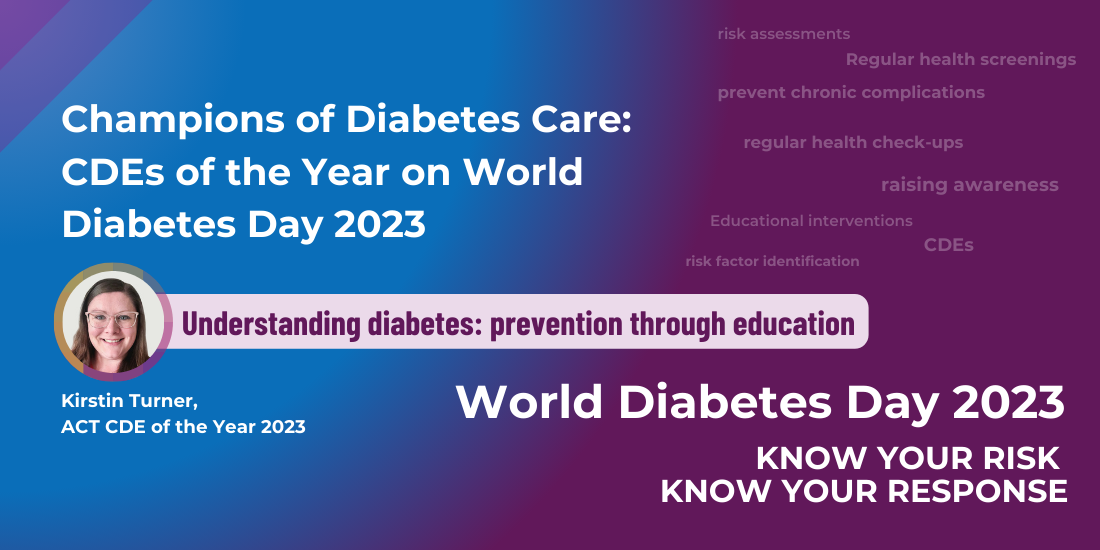
What role does education play in preventing diabetes and identifying individuals at risk and how can this education be improved?
Diabetes education starts as a preventative activity and is the foundation of effective and successful diabetes management for a person with diabetes and the community at large.
It is effective in identifying individual risk parameters for type 2 diabetes, including fasting blood glucose, HbA1c, body mass index, waist circumference, systolic and diastolic blood pressure, and signs of insulin resistance.
The global systemic review Community-based educational interventions for prevention of type II diabetes: a global systematic review and meta-analysis is a good example of how education can reduce diabetes incidence rates.
The review concluded that educational interventions may reduce the incidence of diabetes by up to 54%, particularly through reductions in fasting blood glucose levels, body mass index, and waist circumference.
Raising awareness, in the community and among health professionals, of risk-factor identification and the importance of early detection through education is paramount.
Providing culturally appropriate health education is also important.
Risk assessment tools and resources are available; however, if they are not used, they are useless.
Dutch Philosopher Desiderius Erasmus stated in 1500 that ‘prevention is better than a cure’ and this is more than true because early detection is key in diabetes management.
Early detection allows early treatment and intervention, which prevents serious health complications, as well as reduced costs to the healthcare system and community.
How important is it for more of the public to be aware of your role to ensure that they seek your expertise and knowledge?
CDEs are under used in the community and often not thought of as referral options for people at risk or with diabetes.
CDEs can also be in short supply in some areas.
They are valuable at any stage of care for people at risk of diabetes or those living with diabetes.
There is the ability to provide individualised-focused education and care recommendations, which can bring out sustained improvements in patient outcomes and reduced pressure on the health system.
This extends beyond the appointments as the education and individualised approach result in increased confidence and ability to self-implement self-management strategies to significantly improve a person’s quality of life.
What are some of the challenges that people living with diabetes face in accessing diabetes care, and how does your work address these challenges?
There are many challenges that can stem from the financial and psychosocial impacts experienced by people living with diabetes.
There are individual personal challenges including (but not limited to) cultural beliefs surrounding diabetes, lack of resources to access food, medications, diabetes management supplies.
There are also the challenges in making lifestyle modifications due to cost, reduced health literacy, or access to services.
Community-related challenges stem from lack of trained healthcare professionals, increasing healthcare costs, and limited access in some areas resulting in reduced acceptance or facilitation for a person living with diabetes to gain timely help within the healthcare system.
I work with GPs to provide education to people living with diabetes and to individually assess needs and gaps in treatment and/or management.
This allows me to help facilitate necessary referrals, implement or discuss recommendations, and provide ongoing support and education for a person so that overall management and health-related outcomes are improved long term.
It takes a team to manage chronic conditions, and everyone provides input and ensures a person living with diabetes always remains the centre of care.
I have become flexible in my private practice over time to meet the individual needs of people with diabetes in my area.
I have taken on providing bulk billing or reduced fee services to those people with diabetes who are more vulnerable or unable to access care elsewhere due to financial limitations.

“The best thing individuals and communities can do is start conversations about diabetes and risk assessment. ”
Kirstin Turner, ACT CDE of the Year 2023
What have been some of the innovative approaches or strategies you have used to enhance diabetes education and care for your clients and/or to help improve diabetes care and education generally?
The main innovation to enhance care is the use and availability of flash glucose monitoring/continuous glucose monitoring and smart blood glucose level meters.
These allow a person living with diabetes to have more flexibility and information available to them to make daily decisions and allow sharing with their healthcare providers to optimise management or help with recommendations.
Availability of new diabetes medications (for type 2 especially) through the PBS is also making a difference in how we can individualise medication regimes to reduce risks of complications, reduce hyperglycaemia or hypoglycaemia, and reduce medication load and improve adherence long term.
The NDSS is a continued innovation and invaluable resource I use daily with all my education sessions.
It is relevant, centered on a person with diabetes, and available to help with what I am educating about while also allowing a person living with diabetes to self-educate on topics they are interested in or would like to optimise.
What do you believe are the most pressing issues or developments in diabetes care and education, and how do you see your role evolving to address these challenges in the future?
The most pressing issue is access to CDEs and other health professionals to provide early intervention or prevention strategies.
For many people living with diabetes, it is also a cost-of-living situation.
Particularly in being able to access their diabetes supplies, medications, or healthcare service appointments, as well as trying to maintain diet and lifestyle recommendations.
Preventative strategies need more funding and more awareness for uptake to ensure access and uptake from health professionals for people at risk of diabetes.
I continue to see my CDE role as expanding and becoming more holistic in being able to help with risk assessments, as well as diagnosis and optimisation of medication regimes.
I hope to see more government funding in increasing Medicare referral visits to a CDE under a separate healthcare plan or through other potential multidisciplinary-centred approaches.
What are some of the key messages or takeaways you would like people to remember on World Diabetes Day?
I would like people to remember that the risk of developing diabetes is individual and there is more to it than eating too much and not exercising.
It can also be an asymptomatic condition, so regular health screenings and risk assessments are ways to determine risk, as well as intervening at the earliest opportunity to reduce chronic complications or acute medical events occurring.
I would like all health professionals to consider assessing a person’s individual risk where able, remembering the potential for asymptomatic presentation, and intervening and referring for education or further investigations at the earliest stage possible.
The best thing individuals and communities can do is start conversations about diabetes and risk assessment.
My role as a CDE does not stop and so I continuously advocate for people living with diabetes daily and always have best management goals and person-centered care in mind.
I raise awareness of diabetes and provide ongoing education and resources to other health professionals and people to achieve positive outcomes. Diabetes doesn’t stop and so I shouldn’t either.
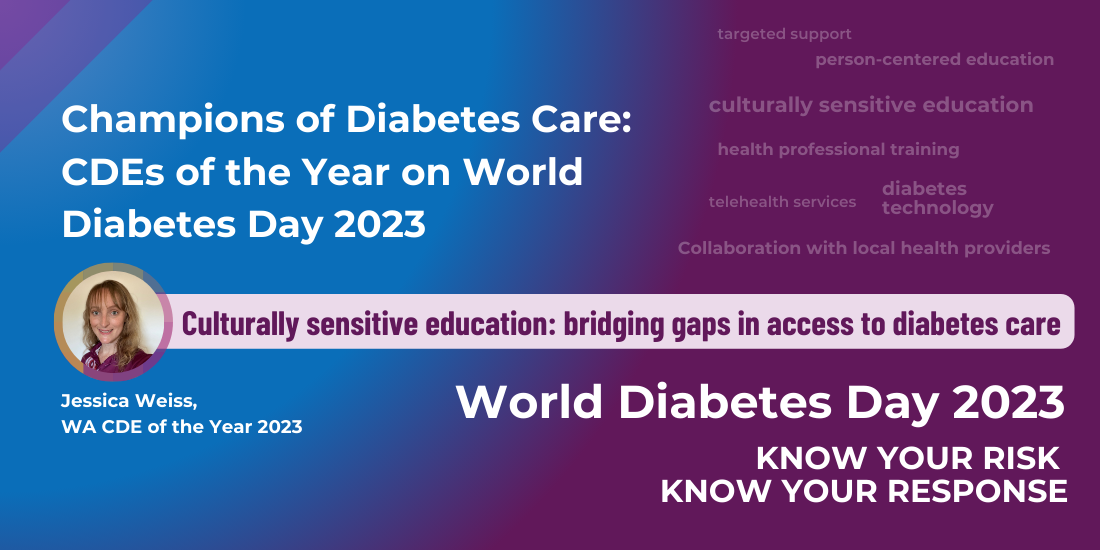
What role does education play in preventing diabetes and identifying individuals at risk and how can this education be improved?
Education about diabetes prevention, and particularly understanding one’s risk factors (including genetics and family history) of developing diabetes to understand how to reduce the risk of developing type 2 diabetes, should be person centred.
This includes being culturally safe and sensitive to personal and social beliefs about health.
The risk of developing diabetes is greatest in regional and remote regions of Australia and is particularly impactful on Aboriginal and Torres Strait Islander peoples.
Education and targeted support around diabetes risk reduction, which includes access to point-of-care screening for diabetes in hospitals and primary care, should be accessible across regional and remote areas of Australia.
How important is it for more of the public to be aware of your role to ensure that they seek your expertise and knowledge?
There are many misconceptions about type 2 diabetes in the public, which can create additional barriers to reaching out for diabetes screening and healthcare support.
The most important parts of being a diabetes educator are to listen and support a person’s goals and beliefs and advocate for person-centred care.
To understand that type 2 diabetes can be a culmination of factors that we cannot control; however, there are things that we can do to prevent diabetes, or if caught early enough, these changes may be able to put diabetes into remission.
Since becoming a CDE, how have you seen the profession change within a diabetes care team/allied health to help ensure people living with diabetes obtain the best access to care and management?
We have seen some amazing advancements in diabetes technology and increased access to technology, including access to continued glucose monitoring for all Australians living with type 1 diabetes.
There have, however, been some changes that have or will result in reduced access to care from specialists and allied health professionals.
I believe the introduction of 60-day prescribing, which will include diabetes medications, is having a significant impact on community pharmacy and the provision of free support forming an essential part of the annual cycle of care.
There have been changes to reduce access to specialist telehealth consultations for rural and remote Australians.
In 2021, the MBS rural loading for specialist telehealth consultations enabling endocrinologists to provide specialised advice and support to some of the most vulnerable communities was removed, reducing access to bulk-billed consultations.
More recently, the proposed changes to MBS funding telehealth consultations requiring a face-to-face appointment before telehealth would make the provision of these services to rural and remote Australia impossible without people travelling to metropolitan areas or enduring long wait lists for tertiary services.
What are some of the challenges that people living with diabetes face in accessing diabetes care, and how does your work address these challenges?
Working at Diabetes WA, I see the challenges faced by those living in rural and remote WA in accessing healthcare.
To improve this equity of access and reduce the lengthy travels to Perth, we provide a statewide telehealth service with consultations with a CDE, dietitian, and endocrinologist without any out-of-pocket expenses.
This includes a responsive gestational diabetes clinic that is working with local health providers and protocols to promote women to birth on country.
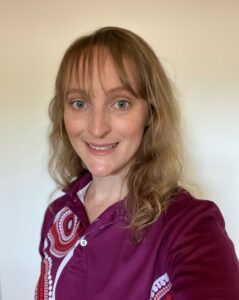
“Access to care when it comes to diabetes prevention or management is vitally important.”
Jessica Weiss, WA CDE of the Year 2023
What have been some of the innovative approaches or strategies you have used to enhance diabetes education and care for your clients and/or to help improve diabetes care and education generally?
One size does not fit all when it comes to diabetes support, and clients should choose solutions that best fit them.
Through consultation and relationship building with regional health professionals, we provide a telehealth service directly to a person’s home and we partner with regional health services and Aboriginal Community Controlled Health Organisations to build capacity and provide support through local health services with familiar and culturally safe support staff.
We also provide health professional training, informed by behaviour change theories to strengthen the workforce across the country to deliver self-management programs.
What do you believe are the most pressing issues or developments in diabetes care and education, and how do you see your role evolving to address these challenges in the future?
Diabetes care is a rapidly evolving space.
While there is more research needed across the whole spectrum, some specific areas that I see in most need include the screening and management of type 2 in youth.
The investment in research and scoping is one element. This activity can often identify viable solutions or advancements in care but lacks the funding for implementation.
With the currently available research about diabetes prevention and remission, there is not a nationally consistent approach, nor adequate TGA recognition or MBS funding, to support and achieve the research.
Further investments in implementing existing research are equally important.
What are some of the key messages or takeaways you would like people to support?
Access to care when it comes to diabetes prevention or management is vitally important.
Ensuring there is no stigma or judgement, providing equity of access to the most vulnerable, providing the right kind of care that is person-centred, and ensuring culturally safe services are all key components to improving early screening, early detection, and better management.
The importance of access to self-managed diabetes tools, including technology, self-education, appropriate screening as part of the annual cycle of care, a multi-disciplinary team, and on-demand support for when things do not go to plan.
A large portion of diabetes-related hospital admissions and complications may be prevented or intervened if caught early enough.
The impact on a person living with diabetes and on the healthcare system would benefit from improving this access for all.
shouldn’t either.
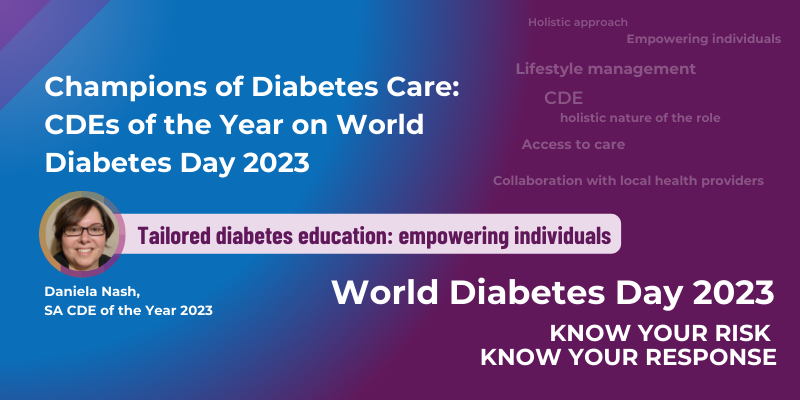
What role does education play in preventing diabetes and identifying individuals at risk and how can this education be improved?
Education is important in preventing type 2 diabetes by providing lifestyle management — educating about healthy eating, exercise, and the diabetes risk factors.
This education needs to be easily adaptable for any person and provided in a way that each person can tailor to their lifestyle.
Another important factor that no one seems to address when talking about preventing type 2 diabetes is that there are no symptoms experienced if glucose levels are just outside of target ranges.
This is the reason for delayed GP visits or for people denying that they have diabetes as they ‘don’t feel anything’.
The Australian Type 2 Diabetes Risk Assessment Tool (AUSDRISK) needs to be used more at general practices, with both GPs and practice nurses needing to encourage people at risk to answer the questions and to provide the tool at health and wellbeing events.
Having AUSDRISK as a link via a QR code may provide easy access for people to use, followed up by advice depending on their risk.
Early detection of complications can be used by ensuring easy access to health checks for all people living with diabetes.
A separate care plan for people with diabetes will ensure Medicare funding for all their health checks, such as dentistry, podiatry, optometry, audiology, psychology/counselling, etc.
This will then become a tick-sheet that healthcare professionals and people living with diabetes would be able to follow and ensure that it is completed every year so complications can be detected early.
How important is it for more of the public to be aware of your role to ensure that they seek your expertise and knowledge?
There needs to be education given to all healthcare professionals first about the all-encompassing role of a CDE.
This education should reflect the holistic nature of the role and view the overall health of a person living with diabetes, including the understanding that all things that happen within/to the body can/will affect glucose levels.
I believe that once the healthcare professionals are educated, then the information will filter through to the general public.
Since becoming a CDE, how have you seen the profession change within a diabetes care team/allied health to help ensure people living with diabetes obtain the best access to care and management?
The role of the CDE needs more exposure and promotion as it’s complex and varied.
Diabetes as a chronic condition requires a greater understanding.
I believe that there are people (healthcare professionals and the general public) who don’t know much about the condition itself, so they don’t realise the value of a CDE.

“Tailored diabetes education is an essential tool for empowering individuals to take control of their health and live fulfilling lives.”
Daniela Nash, SA CDE of the Year 2023
What are some of the challenges that people living with diabetes face in accessing diabetes care, and how does your work address these challenges?
Not having enough access to visits that are bulk-billed in private practice —some people living with tadiabetes cannot afford private fees, do not have enough CDEs to visit, and experience long wait times for appointments in the public health system.
I work in private practice, so I educate people living with diabetes about care plans and how to maximise the time that we spend on appointments.
The ADEA is also advocating, via the parliamentary inquiry, for extra care plan visits for CDEs.
What have been some of the innovative approaches or strategies you have used to enhance diabetes education and care for your clients and/or to help improve diabetes care and education generally?
The approach that I use to educate a person living with diabetes is treating them as an individual and knowing that their diabetes is unique to them.
I tailor the education accordingly and I always get a positive response from each person.
What do you believe are the most pressing issues or developments in diabetes care and education, and how do you see your role evolving to address these challenges in the future?
One of the pressing issues is getting additional subsidised access to diabetes technology (continuous glucose monitoring and pumps) to all people with diabetes, including people living with type 2 diabetes, type 3c diabetes (secondary/other), and gestational diabetes.
In addition, getting access to Medicare for international students living with diabetes while they are studying in Australia.
This will reduce the risk of people living with diabetes getting complications as it’ll be easier for them to track their glucose levels and insulin requirements.

On World Diabetes Day 2023, let’s come together to honour the inspiring work of our members who are transforming the lives of people living with diabetes. Through their dedication and expertise, CDEs are making a significant impact in improving diabetes education and care.
Join us as we celebrate their achievements and reaffirm our commitment to creating a future where diabetes prevention, management, and support are available to all.
| Q&A with NT CDE of the Year 2023, Helen Lamech
Q&A with ACT CDE of the Year 2023, Kristin Turner |

World Diabetes Day often emphasises the importance of prevention and early detection. What role does education play in preventing diabetes and identifying individuals at risk and how can this education be improved?
Education plays a crucial role in preventing diabetes by raising awareness about the symptoms and identifying individuals at risk.
Recognising early signs, such as persistent fatigue, frequent urination, and constant hunger, is vital.
These symptoms, often overlooked as common issues, may indicate underlying diabetes.
Improving education involves fostering a deeper understanding of these signs, dispelling misconceptions, and promoting regular health check-ups.
By enhancing awareness and knowledge, we empower individuals to take proactive steps toward early detection and effective diabetes management.
How important is it for more of the public to be aware of your role to ensure that they seek your expertise and knowledge?
I believe the crucial role of diabetes educators is paramount for the public.
My role as a CDE in Alice Springs brings invaluable knowledge and expertise to the table, ensuring individuals receive the guidance they need to navigate the complexities of diabetes.
By understanding the risk factors, appropriate responses, and necessary care, the public can make informed decisions about their health.
By making them feel safe and supported, they don’t need to go on this journey alone.
Since becoming a CDE, how have you seen the profession change within a diabetes care team/allied health to help ensure people living with diabetes obtain the best access to the care and management?
Since becoming a CDE, I’ve witnessed a significant evolution in the profession.
It’s heartening to observe the inclusion of various health disciplines beyond nursing.
Now, dietitians, pharmacists, podiatrists, and exercise physiologists actively contribute their expertise to enhance health outcomes and broaden access to comprehensive care.
This collaborative approach reflects a positive shift, reinforcing the idea that a multidisciplinary team can better address the diverse needs of individuals living with diabetes, fostering a more holistic and inclusive healthcare landscape.
Also, the integration of technology, particularly close glucose monitoring and insulin pumps.
These advancements serve as a game changer for people living with type 1 diabetes.
What are some of the challenges that people living with diabetes face in accessing diabetes care, and how does your work address these challenges?
As a diabetes and nurse educator based in Alice Springs, I’ve recognised the challenges associated with distance and the high cost of living in this region.
Professionals often hesitate to choose this option, leading to a turnover that impedes the establishment of enduring relationships and trust within the community.
In my role, Healthy Living has strategically employed me to work independently in Alice Springs, addressing this challenge directly.
By being a consistent presence in the community, I aim to build lasting connections, foster trust, and ensure that individuals no longer have to endure the inconvenience of travelling for their diabetes care.
What have been some of the innovative approaches or strategies you have used to enhance diabetes education and care for your clients and/or to help improve diabetes care and education generally?
In Alice Springs, my approach to providing diabetes education involves harnessing the power of a team-based strategy, peer support, and mentorship.
By implementing a mentoring system, individuals navigating their diabetes journey can connect with experienced leaders/members within the community, fostering a supportive environment.
Additionally, I’ve organised social functions such as type 1 retreats and regular catchups for drinks every six weeks.
These gatherings serve as valuable platforms for sharing personal diabetes experiences, allowing community members to find common ground, exchange insights, and provide mutual support.
Through this multifaceted approach, I aim to create a robust and inclusive diabetes education network in Alice Springs.

“The demand for diabetes care is growing exponentially, and it highlights the critical need to train more professionals, including community members and Indigenous health workers, to effectively address this surge.”
Helen Lamech, NT CDE of the Year 2023
What do you believe are the most pressing issues or developments in diabetes care and education, and how do you see your role evolving to address these challenges in the future?
In my perspective, one of the most urgent issues in diabetes care and education is the escalating number of individuals being diagnosed with diabetes surpassing the available resources and educators.
“The demand for diabetes care is growing exponentially, and it highlights the critical need to train more professionals, including community members and Indigenous health workers, to effectively address this surge.“
By expanding the pool of well-trained individuals within the community, we can better meet the increasing demand for diabetes education and care, ensuring that individuals receive the support they need to manage their condition successfully.
What are some of the key messages or takeaways you would like people to remember on World Diabetes Day?
On World Diabetes Day, I’d like people to remember the following.
By embracing these messages, we can work towards a world where diabetes is better understood, managed, and, ultimately, prevented.
How can individuals and communities support the goals of World Diabetes Day and promote better access to diabetes care?
Individuals and communities can support the goals of World Diabetes Day by doing the following:
By actively engaging in these actions, individuals and communities can play vital roles in creating a healthier and more informed society.

What role does education play in preventing diabetes and identifying individuals at risk and how can this education be improved?
Diabetes education starts as a preventative activity and is the foundation of effective and successful diabetes management for a person with diabetes and the community at large.
It is effective in identifying individual risk parameters for type 2 diabetes, including fasting blood glucose, HbA1c, body mass index, waist circumference, systolic and diastolic blood pressure, and signs of insulin resistance.
The global systemic review Community-based educational interventions for prevention of type II diabetes: a global systematic review and meta-analysis is a good example of how education can reduce diabetes incidence rates.
The review concluded that educational interventions may reduce the incidence of diabetes by up to 54%, particularly through reductions in fasting blood glucose levels, body mass index, and waist circumference.
Raising awareness, in the community and among health professionals, of risk-factor identification and the importance of early detection through education is paramount.
Providing culturally appropriate health education is also important.
Risk assessment tools and resources are available; however, if they are not used, they are useless.
Dutch Philosopher Desiderius Erasmus stated in 1500 that ‘prevention is better than a cure’ and this is more than true because early detection is key in diabetes management.
Early detection allows early treatment and intervention, which prevents serious health complications, as well as reduced costs to the healthcare system and community.
How important is it for more of the public to be aware of your role to ensure that they seek your expertise and knowledge?
CDEs are under used in the community and often not thought of as referral options for people at risk or with diabetes.
CDEs can also be in short supply in some areas.
They are valuable at any stage of care for people at risk of diabetes or those living with diabetes.
There is the ability to provide individualised-focused education and care recommendations, which can bring out sustained improvements in patient outcomes and reduced pressure on the health system.
This extends beyond the appointments as the education and individualised approach result in increased confidence and ability to self-implement self-management strategies to significantly improve a person’s quality of life.
What are some of the challenges that people living with diabetes face in accessing diabetes care, and how does your work address these challenges?
There are many challenges that can stem from the financial and psychosocial impacts experienced by people living with diabetes.
There are individual personal challenges including (but not limited to) cultural beliefs surrounding diabetes, lack of resources to access food, medications, diabetes management supplies.
There are also the challenges in making lifestyle modifications due to cost, reduced health literacy, or access to services.
Community-related challenges stem from lack of trained healthcare professionals, increasing healthcare costs, and limited access in some areas resulting in reduced acceptance or facilitation for a person living with diabetes to gain timely help within the healthcare system.
I work with GPs to provide education to people living with diabetes and to individually assess needs and gaps in treatment and/or management.
This allows me to help facilitate necessary referrals, implement or discuss recommendations, and provide ongoing support and education for a person so that overall management and health-related outcomes are improved long term.
It takes a team to manage chronic conditions, and everyone provides input and ensures a person living with diabetes always remains the centre of care.
I have become flexible in my private practice over time to meet the individual needs of people with diabetes in my area.
I have taken on providing bulk billing or reduced fee services to those people with diabetes who are more vulnerable or unable to access care elsewhere due to financial limitations.

“The best thing individuals and communities can do is start conversations about diabetes and risk assessment. ”
Kirstin Turner, ACT CDE of the Year 2023
What have been some of the innovative approaches or strategies you have used to enhance diabetes education and care for your clients and/or to help improve diabetes care and education generally?
The main innovation to enhance care is the use and availability of flash glucose monitoring/continuous glucose monitoring and smart blood glucose level meters.
These allow a person living with diabetes to have more flexibility and information available to them to make daily decisions and allow sharing with their healthcare providers to optimise management or help with recommendations.
Availability of new diabetes medications (for type 2 especially) through the PBS is also making a difference in how we can individualise medication regimes to reduce risks of complications, reduce hyperglycaemia or hypoglycaemia, and reduce medication load and improve adherence long term.
The NDSS is a continued innovation and invaluable resource I use daily with all my education sessions.
It is relevant, centered on a person with diabetes, and available to help with what I am educating about while also allowing a person living with diabetes to self-educate on topics they are interested in or would like to optimise.
What do you believe are the most pressing issues or developments in diabetes care and education, and how do you see your role evolving to address these challenges in the future?
The most pressing issue is access to CDEs and other health professionals to provide early intervention or prevention strategies.
For many people living with diabetes, it is also a cost-of-living situation.
Particularly in being able to access their diabetes supplies, medications, or healthcare service appointments, as well as trying to maintain diet and lifestyle recommendations.
Preventative strategies need more funding and more awareness for uptake to ensure access and uptake from health professionals for people at risk of diabetes.
I continue to see my CDE role as expanding and becoming more holistic in being able to help with risk assessments, as well as diagnosis and optimisation of medication regimes.
I hope to see more government funding in increasing Medicare referral visits to a CDE under a separate healthcare plan or through other potential multidisciplinary-centred approaches.
What are some of the key messages or takeaways you would like people to remember on World Diabetes Day?
I would like people to remember that the risk of developing diabetes is individual and there is more to it than eating too much and not exercising.
It can also be an asymptomatic condition, so regular health screenings and risk assessments are ways to determine risk, as well as intervening at the earliest opportunity to reduce chronic complications or acute medical events occurring.
I would like all health professionals to consider assessing a person’s individual risk where able, remembering the potential for asymptomatic presentation, and intervening and referring for education or further investigations at the earliest stage possible.
The best thing individuals and communities can do is start conversations about diabetes and risk assessment.
My role as a CDE does not stop and so I continuously advocate for people living with diabetes daily and always have best management goals and person-centered care in mind.
I raise awareness of diabetes and provide ongoing education and resources to other health professionals and people to achieve positive outcomes. Diabetes doesn’t stop and so I shouldn’t either.

What role does education play in preventing diabetes and identifying individuals at risk and how can this education be improved?
Education about diabetes prevention, and particularly understanding one’s risk factors (including genetics and family history) of developing diabetes to understand how to reduce the risk of developing type 2 diabetes, should be person centred.
This includes being culturally safe and sensitive to personal and social beliefs about health.
The risk of developing diabetes is greatest in regional and remote regions of Australia and is particularly impactful on Aboriginal and Torres Strait Islander peoples.
Education and targeted support around diabetes risk reduction, which includes access to point-of-care screening for diabetes in hospitals and primary care, should be accessible across regional and remote areas of Australia.
How important is it for more of the public to be aware of your role to ensure that they seek your expertise and knowledge?
There are many misconceptions about type 2 diabetes in the public, which can create additional barriers to reaching out for diabetes screening and healthcare support.
The most important parts of being a diabetes educator are to listen and support a person’s goals and beliefs and advocate for person-centred care.
To understand that type 2 diabetes can be a culmination of factors that we cannot control; however, there are things that we can do to prevent diabetes, or if caught early enough, these changes may be able to put diabetes into remission.
Since becoming a CDE, how have you seen the profession change within a diabetes care team/allied health to help ensure people living with diabetes obtain the best access to care and management?
We have seen some amazing advancements in diabetes technology and increased access to technology, including access to continued glucose monitoring for all Australians living with type 1 diabetes.
There have, however, been some changes that have or will result in reduced access to care from specialists and allied health professionals.
I believe the introduction of 60-day prescribing, which will include diabetes medications, is having a significant impact on community pharmacy and the provision of free support forming an essential part of the annual cycle of care.
There have been changes to reduce access to specialist telehealth consultations for rural and remote Australians.
In 2021, the MBS rural loading for specialist telehealth consultations enabling endocrinologists to provide specialised advice and support to some of the most vulnerable communities was removed, reducing access to bulk-billed consultations.
More recently, the proposed changes to MBS funding telehealth consultations requiring a face-to-face appointment before telehealth would make the provision of these services to rural and remote Australia impossible without people travelling to metropolitan areas or enduring long wait lists for tertiary services.
What are some of the challenges that people living with diabetes face in accessing diabetes care, and how does your work address these challenges?
Working at Diabetes WA, I see the challenges faced by those living in rural and remote WA in accessing healthcare.
To improve this equity of access and reduce the lengthy travels to Perth, we provide a statewide telehealth service with consultations with a CDE, dietitian, and endocrinologist without any out-of-pocket expenses.
This includes a responsive gestational diabetes clinic that is working with local health providers and protocols to promote women to birth on country.

“Access to care when it comes to diabetes prevention or management is vitally important.”
Jessica Weiss, WA CDE of the Year 2023
What have been some of the innovative approaches or strategies you have used to enhance diabetes education and care for your clients and/or to help improve diabetes care and education generally?
One size does not fit all when it comes to diabetes support, and clients should choose solutions that best fit them.
Through consultation and relationship building with regional health professionals, we provide a telehealth service directly to a person’s home and we partner with regional health services and Aboriginal Community Controlled Health Organisations to build capacity and provide support through local health services with familiar and culturally safe support staff.
We also provide health professional training, informed by behaviour change theories to strengthen the workforce across the country to deliver self-management programs.
What do you believe are the most pressing issues or developments in diabetes care and education, and how do you see your role evolving to address these challenges in the future?
Diabetes care is a rapidly evolving space.
While there is more research needed across the whole spectrum, some specific areas that I see in most need include the screening and management of type 2 in youth.
The investment in research and scoping is one element. This activity can often identify viable solutions or advancements in care but lacks the funding for implementation.
With the currently available research about diabetes prevention and remission, there is not a nationally consistent approach, nor adequate TGA recognition or MBS funding, to support and achieve the research.
Further investments in implementing existing research are equally important.
What are some of the key messages or takeaways you would like people to support?
Access to care when it comes to diabetes prevention or management is vitally important.
Ensuring there is no stigma or judgement, providing equity of access to the most vulnerable, providing the right kind of care that is person-centred, and ensuring culturally safe services are all key components to improving early screening, early detection, and better management.
The importance of access to self-managed diabetes tools, including technology, self-education, appropriate screening as part of the annual cycle of care, a multi-disciplinary team, and on-demand support for when things do not go to plan.
A large portion of diabetes-related hospital admissions and complications may be prevented or intervened if caught early enough.
The impact on a person living with diabetes and on the healthcare system would benefit from improving this access for all.
shouldn’t either.

What role does education play in preventing diabetes and identifying individuals at risk and how can this education be improved?
Education is important in preventing type 2 diabetes by providing lifestyle management — educating about healthy eating, exercise, and the diabetes risk factors.
This education needs to be easily adaptable for any person and provided in a way that each person can tailor to their lifestyle.
Another important factor that no one seems to address when talking about preventing type 2 diabetes is that there are no symptoms experienced if glucose levels are just outside of target ranges.
This is the reason for delayed GP visits or for people denying that they have diabetes as they ‘don’t feel anything’.
The Australian Type 2 Diabetes Risk Assessment Tool (AUSDRISK) needs to be used more at general practices, with both GPs and practice nurses needing to encourage people at risk to answer the questions and to provide the tool at health and wellbeing events.
Having AUSDRISK as a link via a QR code may provide easy access for people to use, followed up by advice depending on their risk.
Early detection of complications can be used by ensuring easy access to health checks for all people living with diabetes.
A separate care plan for people with diabetes will ensure Medicare funding for all their health checks, such as dentistry, podiatry, optometry, audiology, psychology/counselling, etc.
This will then become a tick-sheet that healthcare professionals and people living with diabetes would be able to follow and ensure that it is completed every year so complications can be detected early.
How important is it for more of the public to be aware of your role to ensure that they seek your expertise and knowledge?
There needs to be education given to all healthcare professionals first about the all-encompassing role of a CDE.
This education should reflect the holistic nature of the role and view the overall health of a person living with diabetes, including the understanding that all things that happen within/to the body can/will affect glucose levels.
I believe that once the healthcare professionals are educated, then the information will filter through to the general public.
Since becoming a CDE, how have you seen the profession change within a diabetes care team/allied health to help ensure people living with diabetes obtain the best access to care and management?
The role of the CDE needs more exposure and promotion as it’s complex and varied.
Diabetes as a chronic condition requires a greater understanding.
I believe that there are people (healthcare professionals and the general public) who don’t know much about the condition itself, so they don’t realise the value of a CDE.

“Tailored diabetes education is an essential tool for empowering individuals to take control of their health and live fulfilling lives.”
Daniela Nash, SA CDE of the Year 2023
What are some of the challenges that people living with diabetes face in accessing diabetes care, and how does your work address these challenges?
Not having enough access to visits that are bulk-billed in private practice —some people living with tadiabetes cannot afford private fees, do not have enough CDEs to visit, and experience long wait times for appointments in the public health system.
I work in private practice, so I educate people living with diabetes about care plans and how to maximise the time that we spend on appointments.
The ADEA is also advocating, via the parliamentary inquiry, for extra care plan visits for CDEs.
What have been some of the innovative approaches or strategies you have used to enhance diabetes education and care for your clients and/or to help improve diabetes care and education generally?
The approach that I use to educate a person living with diabetes is treating them as an individual and knowing that their diabetes is unique to them.
I tailor the education accordingly and I always get a positive response from each person.
What do you believe are the most pressing issues or developments in diabetes care and education, and how do you see your role evolving to address these challenges in the future?
One of the pressing issues is getting additional subsidised access to diabetes technology (continuous glucose monitoring and pumps) to all people with diabetes, including people living with type 2 diabetes, type 3c diabetes (secondary/other), and gestational diabetes.
In addition, getting access to Medicare for international students living with diabetes while they are studying in Australia.
This will reduce the risk of people living with diabetes getting complications as it’ll be easier for them to track their glucose levels and insulin requirements.